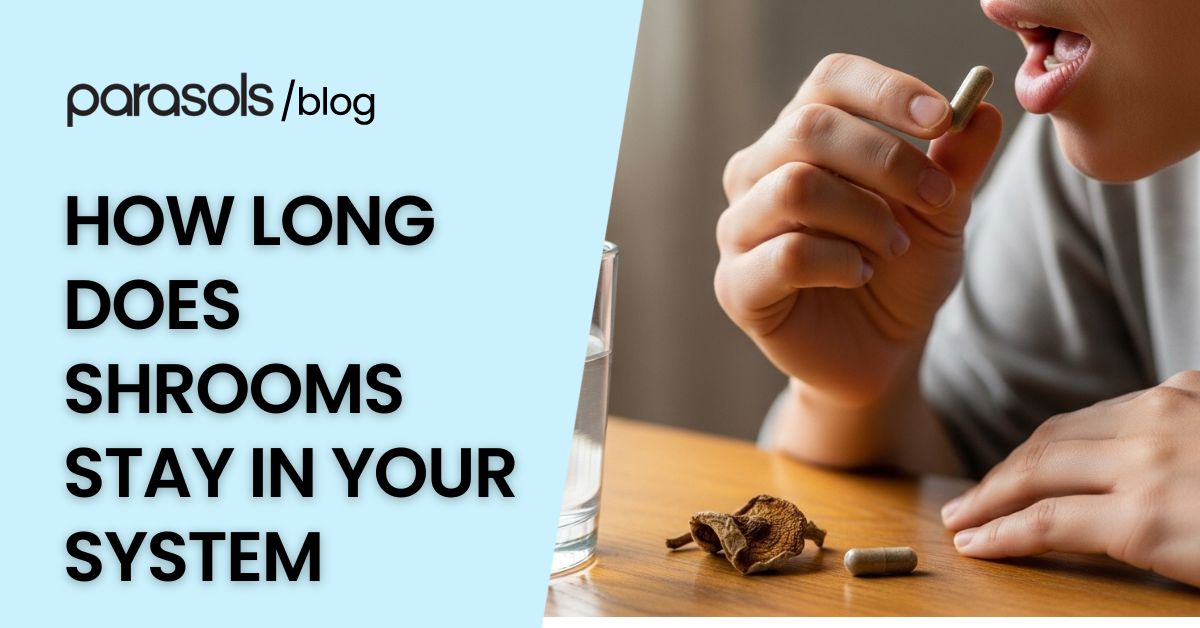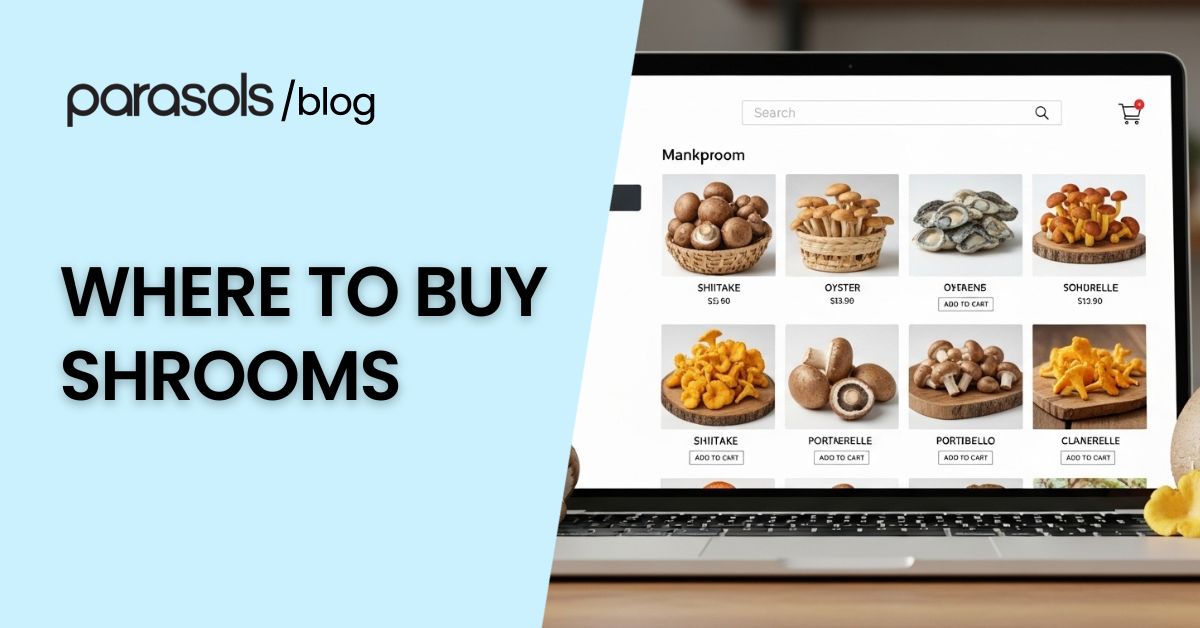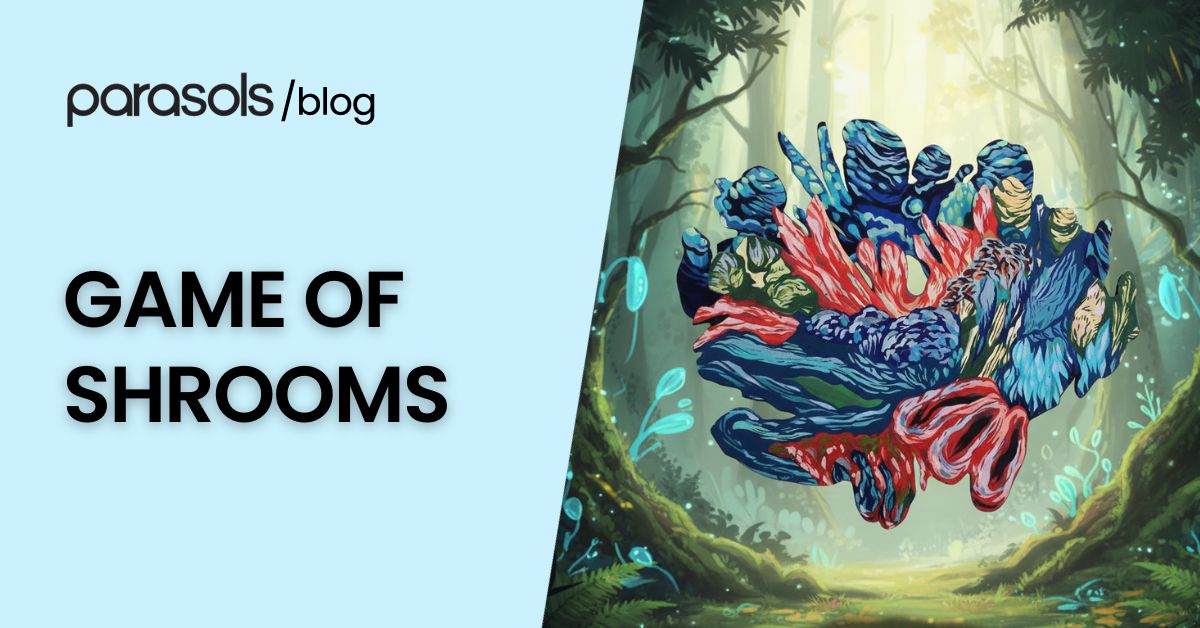When people talk about magic mushrooms, curiosity often goes beyond the psychedelic effects or the experience of a shroom trip. A common question that comes up is: how long do shrooms stay in your system?
Whether it’s concern about drug tests, mental health effects, or just wanting to understand the body’s metabolism, knowing the factors that influence detection windows can help bring a bit of clarity to a topic often surrounded by uncertainty.
Key Takeaways
- Shrooms usually produce effects for only a few hours, but traces can remain longer depending on the test type
- Factors like dosage, metabolism, frequency of use, stomach contents, and overall health affect how long psilocybin stays in the system
- Most standard drug tests don’t detect psilocybin, but specialized blood, urine, or hair tests may identify it
- Hair tests can sometimes detect psilocybin use for up to 90 days or more
- Responsible use, supportive environments, and mindful dosing help ensure safer and more positive experiences
How Long Does Shrooms Stay in Your System?

Shrooms, or psilocybin mushrooms, typically stay in your system for a relatively short duration compared to other substances. The active compound, psilocybin, converts into psilocin in the body, producing hallucinogenic effects that last only a few hours.
However, traces of psilocybin use may still be detectable for a longer period depending on factors like body mass, overall health, frequency of shroom use, and the type of drug test being used.
While most standard drug tests don’t detect psilocybin, specialized tests such as blood, urine, or hair tests may identify it within specific detection windows.
Factors Affecting Shroom High
The length and intensity of a shroom trip can vary widely from person to person. Several factors influence how long the psychedelic effects last and how strongly they’re felt. Here are some of the most common ones to consider:
Dosage and mushroom species
Higher doses and certain mushroom species naturally produce stronger hallucinogenic effects and longer trips. Consuming large doses can extend the experience well beyond the typical few hours, while smaller amounts often fade more quickly.
Body’s metabolism
Faster metabolisms break down psilocybin and eliminate psilocin from the body sooner, leading to shorter highs. On the other hand, slower metabolisms may prolong altered perceptions and extend the shroom trip.
Frequency of use
People who consume shrooms frequently may develop tolerance, which can shorten the intensity and duration of future trips. This means the same dose may feel weaker or wear off faster over time.
Stomach contents
Shrooms consumed orally on an empty stomach usually produce effects more quickly and sometimes more intensely. Eating them after a heavy meal or with other substances may delay onset and change how long the high lasts.
Overall health and mental well being
Physical health, chronic diseases, and mental health conditions can all influence how psilocybin affects the body and mind. Mood swings, muscle weakness, or other health factors may alter how a trip unfolds and how long it feels.
How to Use Magic Mushrooms for Best Effects
Using magic mushrooms responsibly can make the difference between a meaningful experience and a difficult one. While everyone’s body and mind respond differently, there are some practical ways to set yourself up for the best effects:
- Start with lower doses – Beginning with smaller amounts helps you gauge your body’s reaction, especially if it’s your first time with psilocybin use.
- Choose the right setting – A calm, comfortable environment reduces the chances of a bad trip and supports positive psychological effects.
- Go in with a clear mindset – Your mental health and mood before consuming shrooms can strongly shape the experience, leading to either uplifting or challenging altered perceptions.
- Avoid mixing with other substances – Combining shrooms with alcohol or other drugs can increase risks and make effects less predictable.
- Have a trusted companion – A supportive friend can help guide you through difficult moments and enhance your overall mental well being.
- Pay attention to your diet – Taking shrooms on an empty stomach can intensify effects, while maintaining a balanced diet supports recovery afterward.
- Give yourself time to rest – After the relatively short duration of a shroom trip, rest and reflection help your body’s metabolism recover and your mind process the hallucinogenic effects.
Are Magic Mushrooms Legal?
Magic mushrooms, commonly referred to as psilocybin mushrooms, are illegal in most parts of the world because they contain psychoactive compounds that produce hallucinogenic effects. However, laws vary by region—some countries and cities have decriminalized or allowed limited psilocybin use for therapeutic or research purposes.
In places where psilocybin treatment is being studied, healthcare professionals sometimes analyze its potential for addressing certain mental health disorders. Despite growing interest, it’s important to remember that shroom use remains classified as illegal drug use in many jurisdictions, carrying legal risks alongside potential psychological effects.
Final Thoughts

In the end, understanding how long shrooms stay in your system comes down to several factors—ranging from your body’s metabolism to the type of test being used. While the psychedelic mushrooms themselves may only produce hallucinogenic effects for a few hours, traces of psilocybin use can linger depending on health, frequency, and dosage.
If you’re curious about safety, legality, or mental health effects, always consider speaking with a healthcare professional before making decisions about shroom use. For more insights on safe and mindful approaches, check out how to understand psilocybin responsibly. Parasols also offer many different choices of non detect mushroom gummies like our pineapple option.
Frequently Asked Questions
Can shrooms cause physical dependence?
Unlike some other substances, psilocybin mushrooms are not considered physically addictive. They don’t typically cause the body to develop physical dependence in the way that alcohol or opioids might. However, psychological dependence can occur, especially with frequent use, as people may begin to rely on the altered sense of reality or emotional release that shroom use provides.
What are the common physical effects of shrooms?
In addition to producing hallucinogenic effects, psilocybin mushrooms can also cause a range of physical effects. Some people may experience muscle weakness, changes in coordination, or nausea, especially when consumed orally. These effects usually fade within a few hours, but higher doses or sensitive stomachs may lead to more discomfort.
How long does psilocybin stay in hair follicles?
While psilocybin has a short half life in the bloodstream, hair tests may detect psilocybin use for much longer. Because hair follicles can retain evidence of psychoactive compounds, detection windows may extend up to 90 days or more. This is why hair tests are sometimes used in specialized situations where long-term drug use is being examined.
What should I do after a bad trip?
A bad trip can bring on overwhelming altered perceptions, mood swings, and intense psychological effects. It helps to have support groups or a trusted friend to talk with afterward. Grounding activities, such as journaling, light exercise, or focusing on mental well being, can also aid in recovery. If ongoing distress or mental health issues develop, consulting a healthcare professional is strongly recommended.
Can psilocybin interact with other drugs or medications?
Yes, psilocybin may interact with other substances in unpredictable ways. Combining it with stimulants, depressants, or certain prescriptions can increase risks and complicate both physical effects and psychological effects. This is why it’s advised to avoid mixing psilocybin with other drugs and to discuss potential risks with a healthcare provider if you’re taking medications for chronic diseases or mental health conditions.



Leave a comment
All comments are moderated before being published.
This site is protected by hCaptcha and the hCaptcha Privacy Policy and Terms of Service apply.